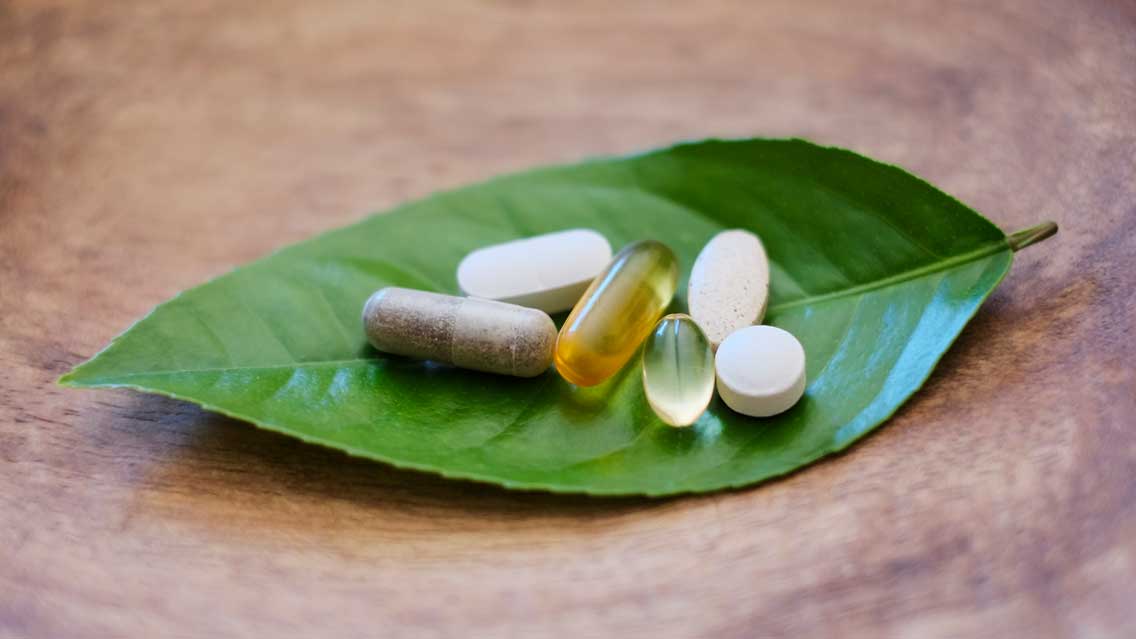A whole-foods diet can help keep your skin healthy, but sometimes therapeutic levels of certain nutrients are needed as well. “When skin diseases arise, I recommend supplements to address root causes more effectively,” explains naturopath Trevor Cates, ND.
These are the key supplements for nourishing your skin. (For more on the value of whole foods, see “What to Eat for Healthy Skin.”)
1. Astaxanthin: This powerful antioxidant from the carotenoid family protects against ultraviolet light, moisturizes the skin, makes it smoother and more elastic, and helps dim spots and freckles.
2. Vitamin A: A deficiency can result in dry, scaly skin and acne. If you have acne, take high doses of vitamin A only under a practitioner’s guidance, says Cates. Retinoids, the active form of vitamin A used in topical skin products, increase damage from sun exposure, so don’t use them if you’ll be outside during peak sun hours.
3. B vitamins: Taking 50 mg of B6 (pyridoxine) daily a week before and during menstruation helps PMS acne flareups, says Dana Cohen, MD. “Most people see improvements after a few months.” Cates recommends niacin (B3) to reduce wrinkles, melasma (skin discoloration), and rosacea, and to inhibit sebum production. Vitamin B5 (pantothenic acid) stabilizes the skin’s barrier, promotes softness and elasticity, and reduces inflammation. (For more on B vitamins, see “All About B Vitamins.”)
4. Vitamin C: Its antioxidant properties aid collagen synthesis, helping prevent wrinkles and brighten the skin.
5. Vitamin D: Technically a hormone, vitamin D is produced by the skin in response to sun exposure. You can also supplement (choose vitamin D3 over D2) to remedy skin conditions such as atopic dermatitis, psoriasis, acne, and rosacea.
6. Vitamin E: “E is essential for the skin,” says Cates. “Applied topically, this antioxidant nutrient reduces wrinkles, stretch marks, fine lines, and brown spots, and works well with vitamin A for inflamed acne.” Cates recommends supplements containing mixed natural forms of vitamin E, such as tocopherols and tocotrienols, to ensure you get the entire nutrient range.
7. Omega-3 fatty acids: The anti-inflammatory properties of these fatty acids mitigate UV damage and protect against cellular oxidation that can damage the structure. They also support the skin’s lipid barrier, helping keep skin hydrated. Choose a brand that has been tested for heavy metals.
8. Probiotics: Supplementing with Lactobacillus, Bifidobacterium longum, and other friendly bacteria helps restore gut-microbiome balance and improve digestion in atopic-dermatitis patients. Vivian Shi, MD, recommends a daily dose of synbiotics (prebiotics and probiotics combined) that contain 10 million to 30 billion colony-forming units.
9. Zinc: Low serum levels of this anti-inflammatory nutrient have been linked to severe acne. “Oral zinc supplements are an important micronutrient for skin growth and repair,” says Cates. Used topically, zinc treats dermatitis, acne, and rosacea. (Not sure if you’re getting enough zinc? Here are 9 signs and symptoms of zinc deficiency.)
Your skin’s appearance is a reflection of your inner health. Learn what to eat and what to avoid for a healthy complexion at “What to Eat for Health Skin” from which this article was excerpted.



This Post Has 0 Comments